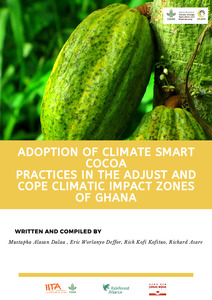Adoption of Climate-Smart Cocoa practices in the adjust and cope climatic impact zones of Ghana
Cocoa (Theobroma Caocao) remains an important crop to the Ghanaian economy, due its historical contribution to revenue, foreign exchange and the creation of direct and indirect jobs. The sector however continues to face production challenges such as aging cocoa trees, reduced soil fertility, pest and disease infestations and recently the effects of climate change. These threaten the productivity and sustainability of cocoa in Ghana. The introduction of Climate Smart Cocoa (CSC) practices for designated climate impact zones in Ghana thus offer significant avenue for improving productivity and livelihood of cocoa farmers (IITA, 2019). Promoting the adoption of Climate Smart Cocoa (CSC) practices among farmers is central to sustaining the crop, improve livelihood and resilience of farmers, and mitigate the emission of greenhouse gas (GHG) (Bunn et at., 2019). Although cocoa farmers are being introduced to CSC practices, their adoption is likely to be influenced by various factors. In Ghana, Akrofi-Atiotianti et al. (2018) established that factors such as the age and location of farms, farmers’ age, residential status and access to extension services influences adoption of Climate Smart Agriculture (CSA) by cocoa farmers. Another key variable relevant to the adoption of Climate Smart Cocoa practices is timely access to weather information by cocoa farmers. The provision of weather stations data to famers can assist them to identify climate trends and improve their climate change risk assessments (UTZ, 2016). Such weather information can be made available to farmers either through the sharing of information within farmer groups or through mobile phone applications. This report presents the factors that influence CSC adoption among selected cocoa farmers in two Climatic Impact Zones in Ghana. It also established how critical farmer access to weather information influences cocoa productivity. Such studies will advise policy makers and help initiate practicable strategies that will facilitate the successful adoption of these practices by farmers. The CCAFS CSC( IITA and Rainforest Alliance) project team adopted the 5Q approach to rapidly access CSC adoption rates among cocoa farmers across two climatic impact zones ( Cope and Adjust ). The main aim was to see if the stepwise CSC Approach being promoted was yielding the desired results and to understand cocoa farmers perceptions on what these gains could be. A Semi-structured questionnaire was administered to 200 cocoa farmers all of whom are part of CSC trials in 4 cocoa growing communities across two climatic impact zones ( Cope and Adjust ) managed by AGRO ECO . This brief report encapsulates the CSC adoption rates and farmers perceptions on the benefits derived from CSC

